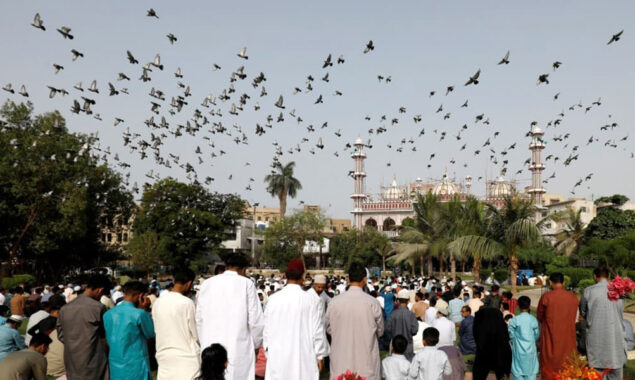
- Government announces a five-day Eid holiday this year
- Eid-ul-Adha holidays will be observed from July 8 to 12
- The day marks the end of Hajj, a five-day pilgrimage all healthy and financially capable Muslims are obliged to undertake
ISLAMABAD: The federal government on Sunday announced a holiday of five days for the Eid-ul-Adha in the country.
According to a notification issued by the PM Office, Eid-ul-Adha holidays will be observed from July 8 to 12.
Here are five things to know about Eid ul-Adha 2022:
Origins
Muslims believe the Prophet Ibrahim (Abraham) was tested by God who commanded him to sacrifice his first-born son, Ismail.
Ibrahim was prepared to submit to the command, but God stayed his hand. Instead, he was told to sacrifice an animal, likely a lamb or sheep.
End of Hajj
Eid-ul-Adha also marks the end of Hajj, a five-day pilgrimage all healthy and financially capable Muslims are obliged to undertake. The Hajj is believed to cleanse the soul of sins and instil a sense of equality, sisterhood and brotherhood.
Around 2.5 million Hajis from around the world gather annually to the cities of Mecca and Medina in Saudi Arabia for the ritual.
Eid prayers
Most Muslims begin celebrating Eid by performing extra prayers in the morning.
Mosques are packed with worshippers on Eid day with outside arrangements made to accommodate large groups of people.
Sacrificing an animal
The occasion of Eid-ul-Adha is marked by sacrificing and animal that Muslims can eat – a goat, sheep, cow or camel – by those who can afford to do so.
In many parts of the Muslim world, special livestock markets are set up for people to buy an animal for the Eid sacrifice.
This year, amid the coronavirus pandemic, numerous apps and websites have appeared
Distribution of meat
The animal sacrifice comes with an element of charity and donation, as the person paying for the qurbani is required to distribute part of it needy people.
The meat of the sacrificed animal is divided among three groups: the person sacrificing it and their immediate family, extended family and friends, and those in need.
Some Muslims will pay the value of an animal to one of a number of Muslim charities around the world that collect funds for remote animal sacrifices, distributing the meat to underprivileged groups – including refugees, the elderly and disabled people.
Catch all the Pakistan News, Breaking News Event and Latest News Updates on The BOL News
Download The BOL News App to get the Daily News Update & Follow us on Google News.




